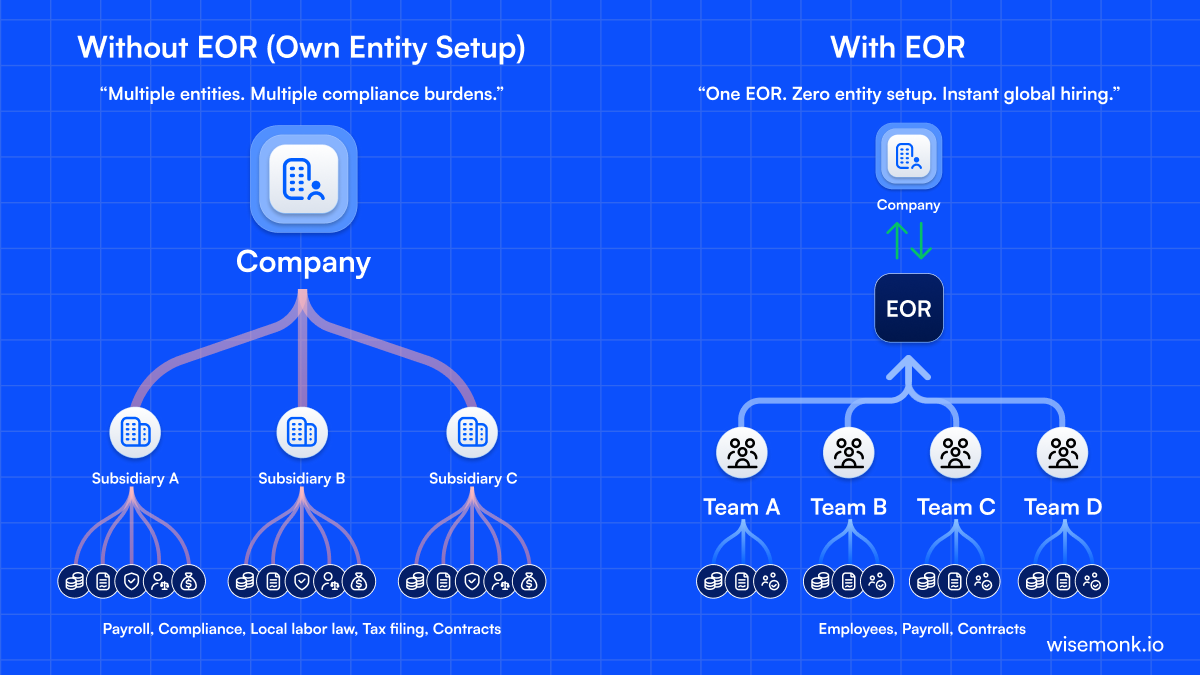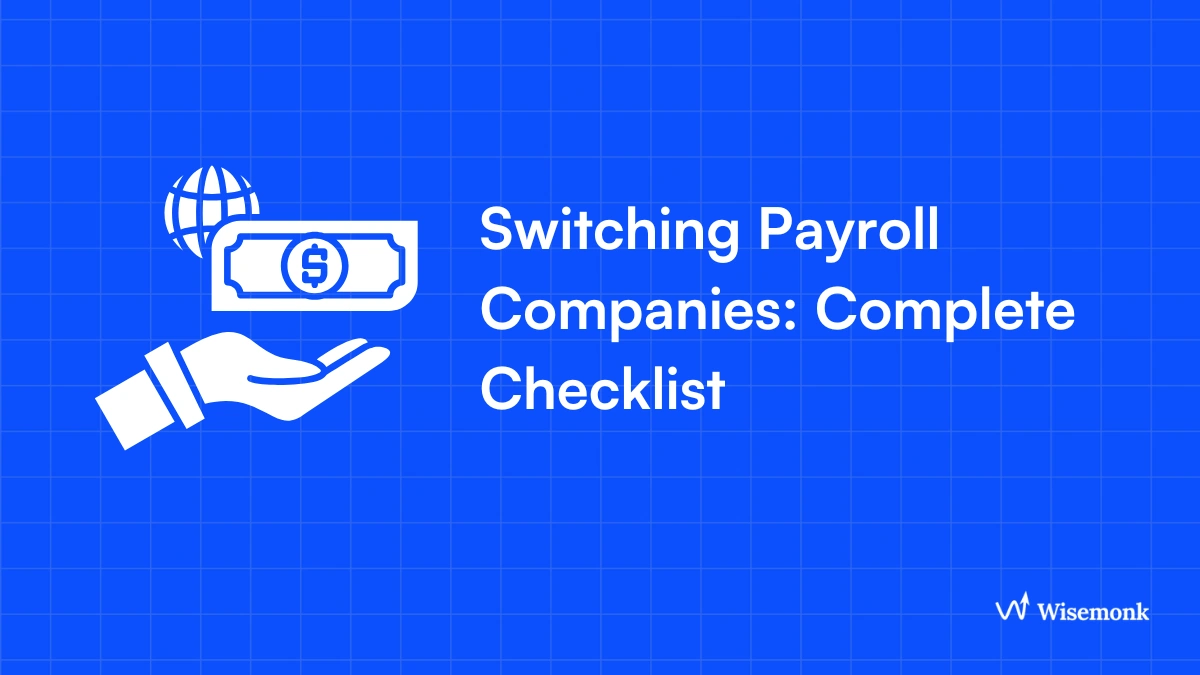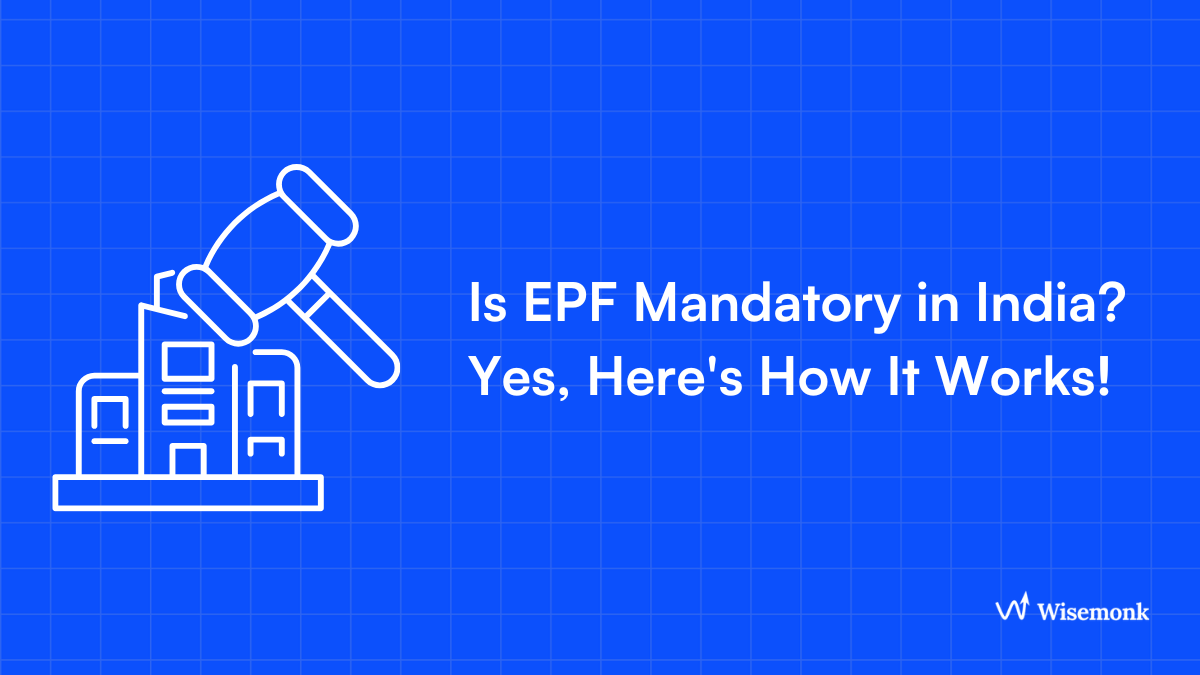- An Employer of Record (EOR) is a third-party company that legally employs your workers in countries where you don't have a local entity. They handle payroll, taxes, benefits, and compliance while you manage daily work.
- Own entity means registering your own legal company in the target country. It costs more upfront but gives you full control and better economics at scale.
- Choose EOR when you need rapid market entry in 2-5 days, testing new markets, avoiding permanent establishment risk, converting contractors to employees, or hiring across multiple countries without entity setup.
- Choose your own entity when you have 15-20+ employees per country, plan 3+ years presence, need local invoicing for client contracts, or require full control over HR policies and employment contracts.
- Transition from EOR to entity when your team crosses 15-20 employees, EOR monthly fees exceed entity costs, or you need local bank accounts and greater operational control.
Need help with your international expansion? Contact our team to learn how we can help streamline your global expansion.
Discover how Wisemonk creates impactful and reliable content.
Looking to expand globally but wondering whether to use an Employer of Record or set up your own entity? The choice is simpler than you think. An EOR gets you hiring in days without setting up a company. Your own entity gives you full control but takes months and costs much more.
This guide shows you the real costs, timelines, and when to pick each option. You'll learn which path works for your goals and when to switch between them as you grow.
What is an Employer of Record (EOR)?[toc=Employer of Record]
An Employer of Record is a third-party company that legally employs your workers in countries where you don't have a local entity. An EOR handles payroll, taxes, benefits, and compliance while you manage the day-to-day work of your employees.
Let's break down the key advantages and limitations of the EOR model:
Pros:
- Hire in 2-5 days without setting up a company
- No incorporation costs or legal fees
- Compliance risk transfers to the EOR
- Easy to scale or exit markets
Cons:
- Monthly fees per employee ($99-$800 depending on country)
- Less control over contracts and benefits
- Can get expensive with larger teams
Best for:
Employer of Record works best when you're testing markets, need quick hiring, or have small teams across multiple countries. We recommend them for companies with fewer than 15-20 employees per country.
What does it mean to set up your own entity?[toc=Own Entity]
Setting up your own entity means registering a legal company in a foreign country. This could be a subsidiary, branch office, or representative office. You directly employ staff, manage operations, and have complete control.
What it involves:
Registering with local authorities, securing licenses, setting up payroll and tax systems, establishing HR infrastructure, and handling ongoing compliance and audits.
Let's break down the key advantages and limitations of entity establishment:
Pros:
- Full control over HR policies, contracts, and operations
- Strong local brand presence and credibility
- Direct employer-employee relationships
- Lower per-employee costs at scale (20+ employees)
- Ability to customize benefits and company culture
Cons:
- High setup costs ($8K-$45K depending on country)
- Takes 2-6 months before you can hire
- Ongoing compliance and administrative burden
- Full legal and tax responsibility falls on you
- Expensive to maintain ($150K-$200K+ annually)
Best for:
Own entities work when you're committed long-term, planning to hire 20+ employees in one country, or need full operational control. If you're building a permanent market presence, this is the right move.
What's the difference between an EOR and your own entity?[toc=EOR vs Own entity Key Differences]
The main difference is ownership and control. With an Employer of Record (EOR), they're the legal employer handling compliance. With your own entity, you're the legal employer with full control but also full responsibility.
From our experience helping companies expand globally, the choice usually comes down to three factors: how fast you need to move, how much you want to invest upfront, and how long you're staying in the market.
Key differentiators:
- Speed: EOR takes 2-5 days. Entity setup takes 2-6 months.
- Control: EOR limits customization. Entity gives you complete control.
- Cost structure: EOR has predictable monthly fees. Entity has high upfront costs but lower per-employee costs at scale.
- Commitment: EOR is flexible and reversible. Entity signals permanent presence.
- Risk: EOR assumes legal liability. You own all compliance risk with an entity.
Detailed comparison:
Cost is often the deciding factor. In the next section, we'll break down the real numbers using a side-by-side example so you can see exactly what each option costs in practice.
How much does EOR vs own entity actually cost?[toc=Cost Breakdown]
The cost difference varies by country, but let's use India as a real-world example to show you how the numbers break down.
Here's what it costs to hire 10 employees in India using each approach. This gives you a clear picture of the major expenses involved.
Corporate Tax ~ 5% = 120% of Employee Cost 17% (Profit margin as per Transfer Pricing requirements) 25% Tax on Profits
Retained Income of Indian Subsidiary ~ 15% = 120% of Employee Cost 17% (Profit margin as per Transfer Pricing requirements) 75% Tax on Profits
Setting up your own entity involves not just the administrative and compliance overhead, but also taxation on profits and retained earnings. These indirect costs can pile up quickly, especially for small or mid-sized businesses testing a new market.
*This is an estimated cost. Actual numbers may vary based on the role and experience.
In this India example:
The EOR saves you $48,480 annually compared to setting up your own entity. That's a 21% cost reduction for a team of 10.
Beyond savings, you skip the 3-month setup process, avoid compliance risks, and eliminate administrative overhead. The entity route typically becomes more cost-effective once you reach 20-25 employees in a single country.
Calculate your exact costs in seconds! Your country and team size will have different numbers. Use our EOR vs Entity Calculator to get an instant breakdown for your specific expansion plan, just enter your headcount and average annual salary/employee.
The numbers tell part of the story, but timing and control matter too. Let's look at when each option makes strategic sense for your business.
When should you choose an Employer of Record?[toc=When to Choose EOR]
Choose an EOR when you need quick market entry, have smaller distributed teams, or want to test before committing to permanent infrastructure.
From our experience in helping hundreds of foreign companies hire employees globally, we can attest that EOR services solve problems that entities can't.
Use an Employer of Record when:
- You want to hire quickly in a new country
- You don't have (or don't want) a local legal entity
- Team size is small or temporary
- You want to avoid legal, payroll, and compliance complexity
- You're testing a market before committing long-term
From what we’ve seen, an EOR service is the perfect partner for companies that need to move fast, stay compliant, and keep their options open as they grow internationally.
When should you choose setting up your own entity?[toc=When to Choose Own Entity]
Set up your own entity when you're planning long-term operations with a significant team in one country, or when local regulations require a registered company.
We see the entity route make sense in specific situations that go beyond just team size:
Choose your own entity when:
- You plan long-term operations in a country
- You have a larger or growing workforce
- You want full control over employment, benefits, and company culture
- EOR costs become high at scale
- You need a local presence for customers, contracts, or regulatory requirements
The rule of thumb: EOR gives you speed and flexibility. Your own entity gives you scale and long-term control.
Now that we've outlined the mandatory entity scenarios, let's walk through the key factors that determine the right approach for your business.
How do you decide between EOR and your own entity setup?[toc=How to Choose]
The choice between choosing an EOR vs own entity comes down to speed, scale, and how long you're staying.
Answer these questions to find your right path:
- How fast do you need to hire? An employer of record gets you hiring in 2-5 days. Legal entity setup takes 2-6 months. Speed wins with EOR.
- How long are you staying? Testing a market for under 2 years? Use EOR. Planning 3+ years? Consider an entity.
- What's your team size? We see a clear pattern, most companies use EOR for their first 15-20 employees("the rule of 20"), then transition to entity ownership once headcount justifies the fixed costs. Below that threshold, EOR is more cost effective.
- Are you hiring across multiple countries? Many companies use a hybrid approach, own entity in their main "hub" country, EOR for satellite workers in other locations. This balances control with flexibility.
- Do you need local presence with physical operations? Manufacturing, office space, or local contracts requiring local bank accounts push you toward entity setup. Pure remote work with compliant employment contracts stays with EOR.
- What's your exit strategy? EOR services let you exit a market in 30-60 days with minimal compliance risks if things don't work out. Closing a legal entity takes 6-12 months and higher costs. If you value flexibility while testing new markets, EOR wins.
Need help with your global hiring strategy? We've helped 300+ companies navigate employer of record vs own entity decisions for international employment. Talk to our team, we'll map out which path fits your expansion plan.
What to look for before partnering with an EOR?[toc=Key Considerations]
As an employer of record provider helping companies expand globally, we know exactly what matters when choosing the right partner.
Here's what you should evaluate:
- Owned entities vs third-party networks: Ask if the EOR owns local entities or outsources to third-party partners. Owned infrastructure gives you direct control and lower compliance risks.
- Proven compliance track record: Look for providers managing 2,000+ employees with established payroll operations. Check G2 ratings and ask for client references in your target markets to verify their track record with local labor laws.
- Transparent pricing structure: Get the complete breakdown upfront: monthly fees, setup costs, payroll processing, and any additional charges. Competitive India EOR rates start around $99/month. Avoid providers with hidden costs.
- Secure technology platform: Verify the platform meets data security standards like SOC 2, ISO 27001, and GDPR. Your employee data and payroll processing need enterprise-grade protection.
- Dedicated account support: Confirm you get a dedicated team, not just ticket support. Look for HR specialists who work in your time zones and understand local regulations.
- Multi-country scalability: Choose an EOR that can grow with you across multiple markets and offer entity setup when you're ready to transition. The best providers handle both EOR services and legal entity establishment.
- Exit strategy support: Ask how they handle transitions if you decide to set up your own entity. Smooth employee transfers and proper documentation prevent compliance gaps during the switch.
This gives you a clear path from testing markets to long-term local presence.
When should you transition from EOR to your own entity?[toc=Transitioning from EOR]
Most companies make the switch at 15-20 employees in a single country, or when their annual EOR costs start approaching entity setup expenses.
Here's the transition process:
- Watch for these signals: Your team crossed 15 international employees in one market. You're planning multi-year operations. Your monthly EOR fees now match what entity setup and maintenance would cost annually.
- Run the cost comparison: Calculate your annual employer of record fees against legal entity setup costs ($15K-$45K upfront) plus ongoing entity management expenses ($150K-$200K yearly). The break-even point typically hits at 15-20 employees.
- Start entity registration early: Begin the legal entity setup process 3-6 months before leaving your EOR. This prevents hiring gaps and maintains compliance during the transition.
- Handle the local entity registration: Register with local authorities, establish payroll systems, open local bank accounts, and prepare tax compliance infrastructure. Entity setup takes 2-6 months depending on the country.
- Transfer employment contracts smoothly: Coordinate with your EOR to move employees to your new entity. This includes transferring employment contracts, statutory benefits, and payroll records without disrupting operations.
- Get local expertise for compliance: Work with local HR, legal, and tax advisors who understand country-specific regulations. Proper entity management requires ongoing compliance with local labor laws and reporting requirements.
We support both EOR and entity setup. We help you with employer of record services in India and also help companies establish their own legal entities when ready. Talk to our experts today!
Of course, setting up an entity isn't your only option. If you're unhappy with your current EOR, switching providers might be the simpler move. Here's our guide on how to switch EOR providers smoothly.
Why Trust Wisemonk as Your EOR Partner for Global Expansion?[toc=How Wisemonk Helps]
Wisemonk is a leading Employer of Record (EOR) helping global companies hire, pay, and manage employees, without the hassle of setting up a local entity. With our deep understanding of local employment laws, tax compliance, and cross-border workforce management, we enable businesses to expand quickly while staying compliant and efficient.
Here’s how we help global businesses.
- We act as the legal employer for your global team in India, handling employment contracts, payroll, benefits, and compliance under local regulations.
- Hire and onboard top Indian talent in under a week, fully compliant with India’s labor and tax laws.
- We handle PF, ESI, gratuity, professional tax, and income tax filings to keep your team compliant year-round.
- Provide competitive and compliant benefits like health insurance, paid leave, and retirement plans tailored to Indian labor norms.
- Ensure new hires are productive from day one with laptops and IT setups delivered directly to their doorstep.
- Our HR experts manage day-to-day HR tasks, ensuring employee satisfaction and smooth operations.
Client review/feedback:
“Wisemonk has helped us hire right people from India for a Canadian entity. The process is so smooth we don't even notice that our payroll has people in both Canada and India.”
- Dinesh A.
Co-founder and CTO
Read the full review on G2 →
“Wisemonk has successfully hired high-quality candidates, which has impressed the client. The team is responsive to the client's requests and changes via Slack. The team also collaborates through a hiring tracker in Google Sheets. Wisemonk communicates via email and virtual meetings.”
- Dan Sampson
VP of Engineering, Cobu
Read the full review on Clutch →
Wisemonk services is designed to streamline every aspect of hiring and managing employees in India, so you can focus on growing your business while we handle the complexities.
Beyond these core services, Wisemonk also provide advanced support in contractor management, company registration, and work permit & visa assistance and building offshore teams or Global Capability Centers (GCCs) in India for businesses planning long-term India operations.
Ready to build your high-performing team in India? Book a Call Now!
Frequently asked questions
What is the cost of setting up your own entity?
Entity setup costs depend on the country, entity type, and your industry. Upfront costs include registration fees, legal services, and infrastructure setup. Ongoing costs include compliance management, payroll systems, tax filings, and admin staff. The per-employee cost drops with larger teams, but the fixed overhead stays high compared to EOR.
What is a Professional Employer Organization (PEO)?
A Professional Employer Organization (PEO) is a third-party provider that helps manage HR services like payroll, benefits, and compliance. You stay the legal employer.
What’s the difference between an EOR and a PEO?
A PEO co-employs your workers while you remain the legal employer. An EOR becomes the legal employer and handles all compliance and payroll. For details, read our "PEO vs EOR: What is the correct strategy for your organization?" article.
When to use an employer of record?
Use an EOR when you need to hire in 2-5 days, test new markets without entity setup, lack local compliance expertise, avoid permanent establishment risk, or manage small teams across multiple countries.
What is the difference between contractors and employees ?
Contractors work independently with their own tools and schedule. Employees work under your direction with set hours and company equipment. Misclassifying them creates tax and legal compliance risks. Learn more: Know the Difference Between Contractors vs Employees in 2026.
Can I switch from an EOR to my own legal entity later?
Yes. Most companies start with an EOR for speed, then transition to their own entity once they hit 15-20 employees and commit long-term.
What are common misconceptions about Employer of Record vs own legal entity?
Many think EOR and PEO are the same. They're not. An EOR is the legal employer when you lack a local entity. A PEO co-employs when you already have an entity. Another myth is that contractors and employees are interchangeable. They're not. Misclassification causes compliance problems. Finally, some believe EOR services eliminate all risk. The EOR handles compliance, but with your own entity, you own all legal and tax risks.



